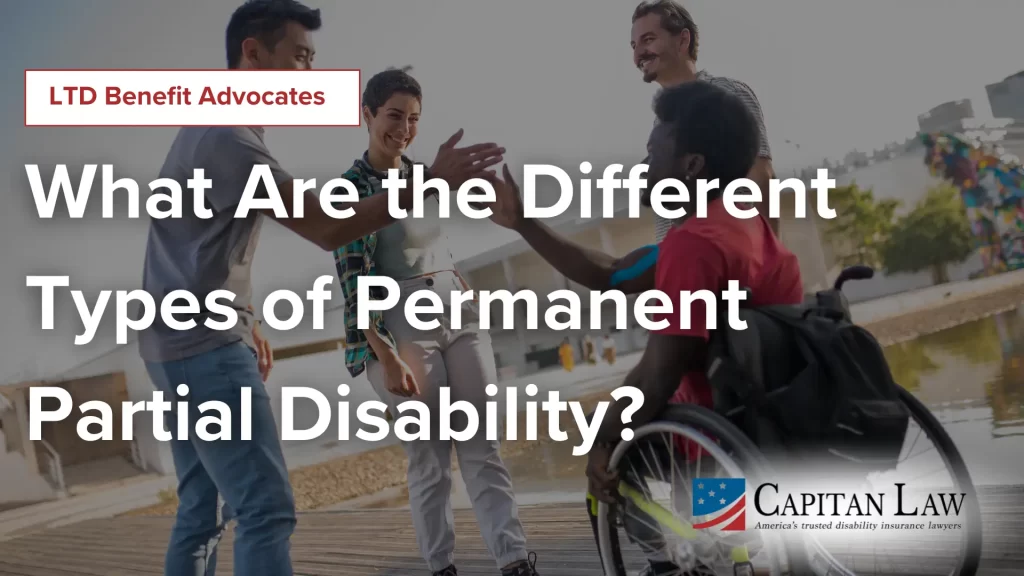
Did you suffer an injury or medical impairment that affects your ability to work but hasn’t completely stopped you? If so, you might qualify for partial disability benefits if you have insurance through your employer or purchased it yourself. These benefits pay a percentage of your missing income, helping you make ends meet while your impairment affects your living ability. Let’s explore the different types of permanent partial disability benefits you could be entitled to.
What Is Partial Disability?
Disability insurance pays benefits to a policyholder whose ability to work is affected by a medical impairment, including cases of permanent partial disability. Disability benefits typically cover a percentage of the income the worker has lost. While specific terms vary greatly from policy to policy, many provide limited benefits if the policyholder becomes partially disabled, meaning they can still work to some degree. Still, their impairment limits their ability to do so. In these cases, partial disability may pay a portion of the difference between what the worker used to earn and what they can currently earn while working part-time.
Disability insurance comes in two general types: short-term and long-term policies. Short-term disability (STD) policies generally cover a few months of disability, typically up to six months or a year – enough to help workers while they recover. Long-term disability (LTD) policies, on the other hand, can last for years, potentially even for life, covering workers who’ve suffered permanently impairing injuries or medical conditions, including those with permanent partial disability. Short-term disability policies typically begin within a few weeks after a worker develops a disabling condition, while long-term disability policies may not activate until a worker has been disabled for several months.
Own-Occupation Permanent Partial Disability
Different disability insurance policies approach what they will cover. One definition is “own occupation,” which means a policy pays benefits if workers cannot perform their duties. Partial own-occupation disability insurance applies when a worker can perform their job part-time but not full-time, often in cases of permanent partial disability.
Here’s an example to illustrate this definition of disability. A surgeon develops a condition affecting her circulation, preventing her from standing for long periods. While she can perform simple procedures, she can’t complete complex ones. Thus, she may qualify for partial own-occupation disability benefits to bridge the gap between her pre- and post-diagnosis salaries, reflecting her permanent partial disability.
Any-Occupation Partial Disability
Many policies use “any occupation” as another definition of disability. These policies activate only if the policyholder cannot perform any kind of work due to their impairment. To illustrate this concept, let’s return to the surgeon in our earlier example. Since the surgeon can still work in some capacity, she cannot claim the full benefits from an any-occupation policy. However, if her condition prevents her from working full-time, she may qualify for a partial permanent benefit.
Pros and Cons to Consider
 As you can see, long-term own-occupation disability policies provide more robust coverage than other policies. However, the downside is that own-occupation policies tend to have higher premiums than any policies. The insurance company faces a greater risk of payouts, so it defrays this risk by charging a higher premium.
As you can see, long-term own-occupation disability policies provide more robust coverage than other policies. However, the downside is that own-occupation policies tend to have higher premiums than any policies. The insurance company faces a greater risk of payouts, so it defrays this risk by charging a higher premium.
The main advantage of any-occupation policies is their affordability—they generally have lower premiums than own-occupation policies. However, the trade-off may make it harder to qualify for benefits, leaving individuals unsupported if they can’t perform their specific job but can work in another capacity.
Contact Our Disability Insurance Lawyers
Did you suffer a medical impairment that prevents you from earning a living, including cases of permanent partial disability? If you have disability insurance, you could be entitled to benefits for the income you can no longer earn. Unfortunately, insurance companies are for-profit businesses, and they’d prefer not to pay you the full value of your
claim if they can avoid it. Don’t take a rejection or low payout lying down – fight back with the help of
Capitan Law. Our
Philadelphia disability insurance attorneys can
help you demand the benefits you’re entitled to.
Call (267) 419-7888 or contact us online for a free consultation, and let’s get started on your claim today.
Related Posts:
How Long Will It Take to Get Approved for Disability?
Five Tips for Winning Your Disability Claim Appeal
What Not to Say on Your Disability Application
What Paperwork Do I Need From My Doctor For My Long Term Disability Claim?
Are Pre-Existing Conditions Considered in Disability Applications?

 As you can see, long-term own-occupation disability policies provide more robust coverage than other policies. However, the downside is that own-occupation policies tend to have higher premiums than any policies. The insurance company faces a greater risk of payouts, so it defrays this risk by charging a higher premium.
As you can see, long-term own-occupation disability policies provide more robust coverage than other policies. However, the downside is that own-occupation policies tend to have higher premiums than any policies. The insurance company faces a greater risk of payouts, so it defrays this risk by charging a higher premium.